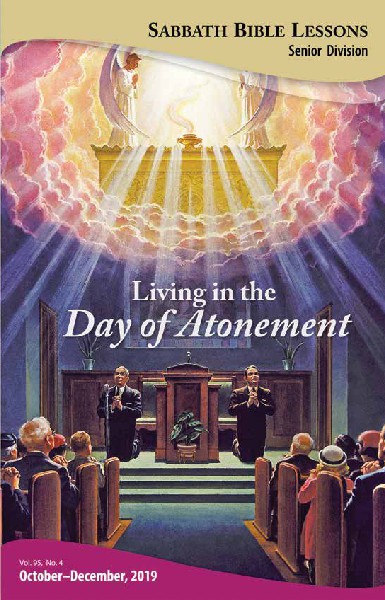Foreword
We are currently living in the antitypical Day of Atonement. What does that mean? Is it simply a technicality—or is it really designed to impact the daily life, future plans, and even the thought patterns of each one of us?
Many do not realize that by nature, every human being is a sinner. We are bent to self-pleasing and inclined to violate the sacred moral law of Ten Commandments that was lovingly custom-designed for our happiness.
Nonetheless, “while we were yet sinners, the Son of God died for us. Laying aside His royal robe and kingly crown, and clothing His divinity with humanity, He stooped to our estate to rescue us from the thraldom of sin. For our sakes He became poor, that we through His poverty might be made rich. He came to this earth to take His position at the head of humanity. In our behalf He bore the stroke of divine justice.”—Australasian Union Conference Record, April 1, 1901.
“Christ is in the heavenly sanctuary, and he is there to make an atonement for the people. He is there to present His wounded side and pierced hands to His Father. He is there to plead for His Church that is upon the earth. He is cleansing the sanctuary from the sins of the people. What is our work?—It is our work to be in harmony with the work of Christ. By faith we are to work with Him, to be in union with Him.
“All heaven is interested in the work that is going on in this world. A people is to be prepared for the great day of God, which is right upon us; and we cannot afford to let Satan cast his shadow across our pathway, and intercept our view of Jesus and His infinite love. We should draw from Christ the very help we need.”—The Review and Herald, January 28, 1890.
“Christ has pledged Himself to be our substitute and surety, and He neglects no one. He who could not see human beings exposed to eternal ruin without pouring out His soul unto death in their behalf, will look with pity and compassion upon every soul who realizes that he cannot save himself.
“He will look upon no trembling suppliant without raising him up. He who through His own atonement provided for man an infinite fund of moral power, will not fail to employ this power in our behalf. We may take our sins and sorrows to His feet; for He loves us. His every look and word invites our confidence. He will shape and mold our characters according to His own will.”—Christ’s Object Lessons, p. 157.
As we study these lessons for the next three months, will we cooperate with His Holy Spirit by allowing Him to do exactly that?
The General Conference Sabbath School Department

